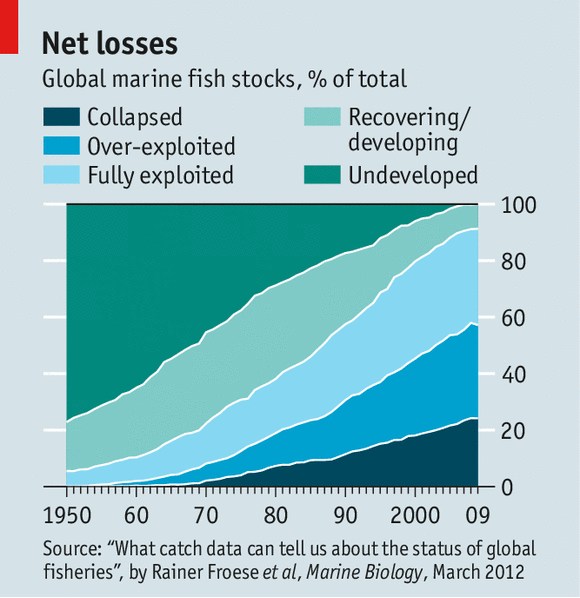The oceans are vitally important to mankind. The oceanic environment is deteriorating, and international cooperation is vital to its protection. UNESCO could facilitate some of that cooperation, but the U.S. Congress has blocked U.S. funding for UNESCO. The Senate has more than a dozen treaties awaiting ratification, some submitted more than 30 years ago.
ABOUT 3 billion people live within 100 miles (160km) of the sea, a number that could double in the next decade as humans flock to coastal cities like gulls. The oceans produce $3 trillion of goods and services each year and untold value for the Earth’s ecology. Life could not exist without these vast water reserves—and, if anything, they are becoming even more important to humans than before.This article in The Economist indicates that the oceans are deteriorating because we haven't managed to develop common property institutions that work to protect them. Fisheries are being over exploited. Large areas are oxygen depleted and dead. Coral reefs are in trouble. Acidification of ocean waters is occurring and likely to become dangerous. Further treats are in view from off shore drilling and deep sea mining. Climate change may threaten the ocean currents, with profound consequences.
The Economist
UNESCO is the international agency leading in ocean science, and it hosts the Intergovernmental Oceanographic Commission. Its World Heritage Center implements the World Heritage Convention; it has declared Papahānaumokuākea, an oceanic World Heritage site, accepting the U.S. plan for its protection and conservation of its resources. The United States has not paid its assessed contributions to UNESCO for more than two years, and is banned by the Congress from any funding for the Organization.
The following international treaties relating to ocean protection have been submitted to Congress, but never ratified:
- Vienna Convention on the Law of Treaties, done at Vienna May 23, 1969, and signed by the United States on April 24, 1970; submitted to Senate November 22, 1971.
- Maritime Boundary Agreement between the United States of America and the Republic of Cuba, signed at Washington December 16, 1977; submitted to Senate January 19, 1979.
- Amendment to the 1973 Convention on International Trade in Endangered Species of Wild Fauna and Flora (CITES), done at Gaborone April 30, 1983; submitted to Senate October 4, 1983.
- Convention on Biological Diversity, done at Rio de Janeiro June 5, 1992, and signed by the United States at New York on June 4, 1993; submitted to Senate November 20, 1993.
- United Nations Convention on the Law of the Sea, done at Montego Bay December 10, 1982 (the “Convention”) and Agreement relating to Implementation of Part XI of the Convention, done at New York July 28, 1994 (the “Agreement”); Agreement signed by the United States on July 29, 1994; submitted to Senate October 7, 1994.
- Stockholm Convention on Persistent Organic Pollutants, done at Stockholm May 22, 2001, and signed by the United States on May 23, 2001; submitted to Senate May 7, 2002.
- 1996 Protocol to the Convention on the Prevention of Marine Pollution by Dumping of Wastes and Other Matter, 1972, done at London November 7, 1996, and signed by the United States March 31, 1998; submitted to Senate September 4, 2007.
- Agreement on the Conservation of Albatrosses and Petrels, with annexes, done at Canberra June 19, 2001; submitted to Senate September 26, 2008.
- Annex VI on Liability Arising From Environmental Emergencies to the Protocol on Environmental Protection to the Antarctic Treaty (Annex VI), adopted on June 14, 2005; submitted to Senate April 2, 2009.
- Agreement on Port State Measures to Prevent, Deter and Eliminate Illegal, Unreported and Unregulated Fishing, done in Rome November 22, 2009 and signed that day on behalf of the United States; submitted to Senate November 14, 2011.
- Convention on the Conservation and Management of High Seas Fishery Resources in the South Pacific Ocean, done at Auckland, New Zealand November 14, 2009 and signed on behalf of the United States on January 31, 2011; submitted to Senate April 22, 2013.
- Convention on the Conservation and Management of High Seas Fisheries Resources in the North Pacific Ocean, concluded in Tokyo on February 24, 2012 and signed on behalf of the United States on May 2, 2012; submitted to Senate April 22, 2013.
- Amendment to the Convention on Future Multilateral Cooperation in the Northwest Atlantic Fisheries, adopted in Lisbon, Portugal September 28, 2007; submitted to Senate April 22, 2013.

No comments:
Post a Comment